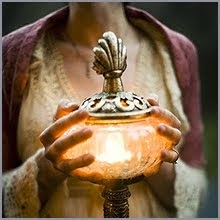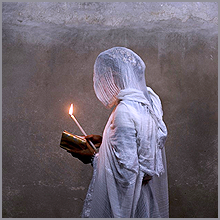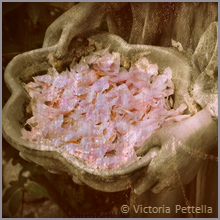 |
We are both crossing over the small canal bridge that divides our residential district from the nature park where we walk our dog. There down in the water something catches our eye, murky yellow and plastic at the bottom of the canal. We take a closer look. It is a lobster pot. Someone had stood on the bridge and lowered it into the water, hoping for a catch - and that someone, whoever it was, was not going to be disappointed. Inside the pot, testing the bars of its plastic prison with its antennae, is a small brown river lobster. Slowly the small lobster circles around, checking every crevice of the pot for a way out. But for we who were staring down at it, the way out is plain to see: the large open hole in the top of the yellow plastic weave was the way it went in, and that circular hole also is the way to freedom. So simple, and so impossible. For such pots are of course designed specifically with the intelligence level of the average lobster in mind. And lobsters cannot figure the way out, however obvious that route seems to us. We watch the lobster's efforts. At times it is as close to freedom as the length of its own short tail. But it stays trapped. We leave the animal to it's fate. It is beyond our reach anyway, and this simple but effective prison, with no keys and an open door, holds it as secure as a maximum security wing. At times we all find ourselves in that lobster pot. Like the lobster, we might circle around, but being right in the situation, we miss the opening that would lead to freedom. The way out of our situation that might be so painfully obvious to those who care for our welfare is passed over by us in our despair, and we remain a prisoner of circumstances. Perhaps that prison takes the form of a physically abusive partner, or, in some ways perhaps equally insidiously, a partner who encourages us in a thousand subtle ways to imagine that we have all the freedom in the world. But freedom can be illusory. In reality that partner, slowly, and step by silent step, ensures our dependence upon them. There is a further kind of lobster pot in which we might find ourselves. That is the one in which we actually can see the opening - in which we can see the way out as plain as anything. But for any number of reasons, we choose to stay right where we are. What stops us seeking freedom might be fear - fear of the partner, fear of the unknown world outside the pot, fear of losing the security which the pot appears to offer, however confined its space. And it is that very factor of security whose influence on our thinking can be as effective as any bunch of warder's keys. We might decide that a partner who provides for a comfortable living is a reasonable trade-off against that partner's infidelity - or against a love whose well has gone dry. And so we stay in the pot, even when the opening is in plain sight. So is foregoing the simple freedom to live our lives as we feel we should, or as we feel that we are meant to, the price which we pay for living inside our particular lobster pot, whatever form that pot might take? As often as not, it probably is. We settle down to a life of captivity and become someone else's version of us. Freedom, if it comes at all, might come too late for us to know what to do with it when finally we hold that freedom in our hands. We have become conditioned to captivity. But the outcome is not always either a convenient or a happy one. The situation known to us personally, and which has been on our mind while we have been writing this post, ended tragically, in a death. A prison is still a prison, however comfortable we are made to feel inside it. Sometimes the loss of our freedom comes with other compensations which make it more-or-less agreeable. But sometimes it comes at a very high price indeed.
Painting by Edward Robert Hughes







































The Lobster Pot is a brilliant analogy to the mental and emotional prisons we often place ourselves in. The fact that the escape hatch is right there in front of us makes this even more puzzling or tragic as the case may be. Thank you Emma for this story of the lobster pot that contains a great lesson for each of us to ponder and reflect upon.
ReplyDelete